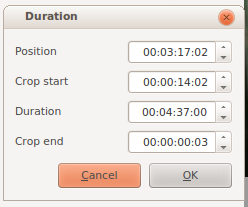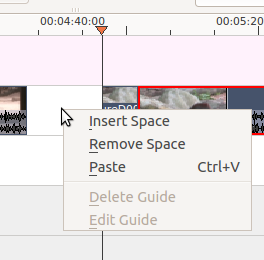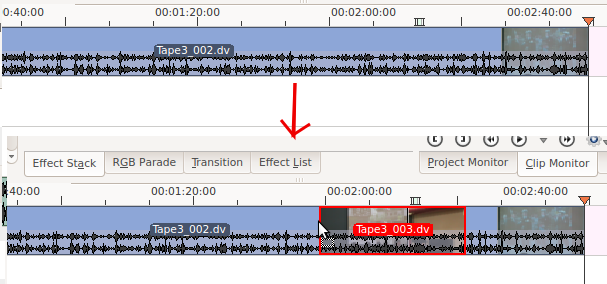Kdenlive/Manual/Timeline/Editing: Difference between revisions
Marked this version for translation |
m fix minor formatting issues |
||
| Line 26: | Line 26: | ||
<!--T:9--> | <!--T:9--> | ||
* | * Dragging the position carat in the [[Special:myLanguage/Kdenlive/Manual/Monitors|project monitor]] | ||
==== Cutting a clip ==== <!--T:10--> | ==== Cutting a clip ==== <!--T:10--> | ||
<!--T:11--> | <!--T:11--> | ||
To cut a clip, the easiest way is to place the timeline cursor where you want to cut the clip, then select the clip (left click in it) and use the menu <menuchoice>Timeline > Current Clip > Cut Clip</menuchoice> (default shortcut: Ctrl+R). | To cut a clip, the easiest way is to place the timeline cursor where you want to cut the clip, then select the clip (left click in it) and use the menu <menuchoice>Timeline -> Current Clip -> Cut Clip</menuchoice> (default shortcut: <keycap>Ctrl+R</keycap>). | ||
<!--T:12--> | <!--T:12--> | ||
Revision as of 19:01, 29 October 2012
Editing
Editing is done in the Timeline. Add a clip by dragging it from the project tree or the Clip Monitor. Once a clip is dropped on a track, it can be moved (drag and drop it) to another place on the track or on another track.
Seeking through your project
The timeline cursor shows your current position in the project. It can be moved by clicking / dragging in the Timeline ruler or in an empty area of the timeline. Other ways to move the timeline cursor are:
- The keyboard right / left arrows
- Rotating the mouse wheel while the pointer is over the timeline ruler or over the project monitor
- Editing the timecode in the project monitor timecode widget
- Clicking the up or down arrows on the project monitor timecode widget
- Dragging the position carat in the project monitor
Cutting a clip
To cut a clip, the easiest way is to place the timeline cursor where you want to cut the clip, then select the clip (left click in it) and use the menu (default shortcut: Ctrl+R).
Alternatively - use the Razor Tool.
Resizing a clip
A clip can be resized from start or from end by dragging its left or right edge. If you want a more precise resize, you can place the timeline cursor wherever you want the resize to end, and use the menu Timeline (default shortcut: 1) or Timeline (default shortcut: 2)
To even more precisely control the length of a clip double click it in the time line and adjust its duration using the Clip duration dialog. You can have frame level accuracy with this method.
You can also resize a clip by cutting it with the Razor Tool and then deleting the bit you do not want.
Removing Space Between Clips
Right click in the space between the clips and choose remove space. Be aware however that if you have clips on multiple tracks in the time line and they are not grouped - then removing space may disturb the alignment of the clips between the different tracks - the space is only removed from the timeline where you clicked. Under this situation it may be safer to use the Spacer Tool.
Bottom Tool Bar
There is a toolbar under the timeline that controls various aspects of the editor.
The first 6 buttons on this toolbar belong to two groups of three buttons. These are the same settings that are controlled by the tool menu.
Active buttons are light blue with a box around them.
Edit Mode Group (one of these can be active)
1. Normal Mode
2. Overwrite Mode
3. Insert Mode
Tool Group (one of these 3 can be active)
4. Selection Tool
5. Razor Tool
6. Spacer Tool
Zoom Tools
7. Fit Zoom to Project
8. Zoom project including (L to R) zoom out, zoom level and zoom in
Ungrouped (These toggle on and off independently)
9. Split Audio and Video Automatically
10. Show Video Thumbnails
11. Show Audio Thumbnails
12. Show marker comments
13. Snap
Normal Mode
In this edit mode you can not drag clips on top of other clips in the same track in the timeline. You can drag them to another track in the time line but not into the same track at the same time point as an existing clip. Contrast this to overwrite mode.
Overwrite Mode
In this edit mode you can drag a clip into a track where there is an existing clip and the incoming clip will overwrite the existing clip over the length of the incoming clip.
The bottom of the picture shows how the track shown at the top changes after a clip has been dragged into it while the project is running in overwrite edit mode.
Insert Mode
This is not implemented yet.
Selection Tool
Use this to select clips in the timeline. The cursor becomes a hand when this tool is active.
Razor Tool
Use this to cut clips in the timeline. The cursor becomes a pair of scissors when this tool is active.
Spacer Tool
Use this tool (![]() ) to temporarily group separate clips and then drag them around the time line to create or remove space between clips. Very useful. Experiment with this tool to see how it works.
) to temporarily group separate clips and then drag them around the time line to create or remove space between clips. Very useful. Experiment with this tool to see how it works.
In the above example these clips are not grouped. However, the spacer tool groups them temporarily for you so you can move them all as a group.
Fit Zoom to Project
This will zoom the project out so that it all fits in the timeline window. This is the same function that is triggered by Timeline Menu item, .
Zoom project
The magnifying glasses zoom in or out on the timeline. The slider adjusts the zoom by large increments. These same settings that are controlled by the menu items, and .
Split Audio and Video Automatically
When this is on and you drag a clip to the time line, the audio in the clip will end up on an audio track and the video on a video track. This produces the same effect as selecting the clip, right click . With this off and you drag a clip onto the timeline both the audio and video tracks are combined into one video track.
Show Video Thumbnails
When on, the video clips in the timeline will contain thumbnails as well a filename. Otherwise they just have the clip filename.
Show Audio Thumbnails
When on, the audio clip will have a wave representation of the audio data as well as a filename. Otherwise they just have the clip filename.
Show marker comments
This toggles on and off the display of the comments saved inside markers (gold and inside the clip in the picture below) and inside guides (purple above the timeline in the picture below).
Snap
When this feature is on, dragging the beginning of one clip near to the end of another will result in the end of the first clip snapping into place to be perfectly aligned with the beginning of the first. As you move the two ends near each other, as soon as they get within a certain small distance, they snap together so there is no space and no overlap. Importantly this occurs even if the clips are in different tracks in the timeline.
Clips will also snap to the cursor position, markers and guides.






